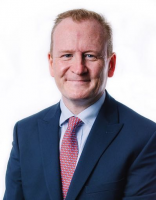Open Letter to Dr. Adam Farmer: An Emotional Goodbye to the Epitome of What a Doctor Should Be

I wouldn’t have believed it myself that you, the doctor who does my colonoscopies and gastroscopies, would become my favourite, but it’s true. And now you’re leaving the UK to fulfill your doctor-dreams in the U.S.
I can’t live without you.
This may sound metaphorical, over-dramatic, and creepy, but I’m not convinced any of those are true. (Although if I am diabolically dependent, I might not be the best judge.) Let me prove to you why my devotion is perfectly placed.
From the beginning, you treated both my husband and me with respect. Many doctors make us patients earn it, which I understand, but it’s hard work. We’re already sick. When our rationed energy has to be spent proving ourselves to be well-researched, in-tune with our bodies, and willing to do our part for our health, we’re left at a deficit. You took the ‘innocent until proven guilty’ approach to deference, and you didn’t have to. I hope in our case, it was easy.
It soon became apparent that our relationship was one of equals. Of course, not in the medical training sense. But you’ve always talked to us as intelligent people, and as an equal part of my health equation. We’ve been a team, working toward the best for my health. “Call me Adam,” you said, some months after ‘working’ together. I couldn’t do it, because calling you “Doctor” was a way to show you my respect. Still, that you offered me your given name reinforced our human equality.
You also believed me, which isn’t a given for so many patients–especially those in pain. You listened to my symptoms, took accurate notes, asked key questions, and took immediate action.
“They didn’t do a gastric-emptying study before implanting the gastric pacer?” Your tone was steady, but we could see the shock in the way you pushed your shoulders back in your chair. “That’s the first thing we’re going to do. I’ll also order a defecating-proctogram. We need to find out what’s really going on.”
To be honest, Dr. Farmer, I can’t say that I thank you for the proctogram. In my forty years of illness and hundreds of tests, sitting on that commode in the centre of the x-ray room with an audience cheering me on as I defecated, was an all-time low. I had to laugh though, as the tears of mortification trickled down my cheeks, because…what else? At least barium, though pumped into every orifice in this case, is painless? And I do thank you for, ahem, getting to the bottom of it all.
Hmmmm. So I was never a suitable candidate for that pacer that caused me so much grief for two years. What did you do? You found me the top surgeon in the country to remove it.
I’m not sure what stage I was at when you called unexpectedly, but I know I was a mess. Yes, you called me (pre-covid) without an appointment just to check on me. It was after-hours. You probably don’t remember that phone call, but I forever will. That is the stuff of an excellent doctor.
You also might not remember that time right before my most recent gastroscopy when you greeted me with a hug. Right there, in front of the hospital staff. It felt a hug of empathy, but also of friendship. I hope the staff were taking notes on compassionate care and how to see a patient as a person.
My situation is currently dire. I had improved for a while. You tell me that is the nature of gastroparesis. Up and down, but all the while, sliding down. And here I am, barely able to eat and getting schooled on feeding tubes. Your eyes oozed kindness as you took, what, an extra half an hour in that appointment, to discuss it all? But that’s no surprise. You’ve always been kind and patient. Never once have I felt rushed out of your door.
And even in the dire, with your stark honesty about my diseased body and what is yet to come, you offered hope. Still, it was hard not to cry as we learned the pros and cons of the different surgically embedded tubes, but it would’ve been okay if I had cried. You are safe.
When you said you’d be leaving in two months, panic choked my gut and throat and I almost couldn’t speak. Did I mention my nausea? Well in this moment it wasn’t the disease. Can I live without you? Will I live without you?
Self-preservation, or perhaps selfishness, joined the panic and I blurted out, “You’ll see me one more time before you go, right?” Despite the overwhelming list of patients you need to wrap up with, the very next day I received a notice of a phone appointment on one of your last days of work here. I’m not lying when I say I cried with relief. Maybe you will still save me. You gifted me two months plus fifteen minutes to cling to that belief.
When it came time to leave after the appointment riddled with tube talk, you asked if we knew where the phlebotomy area was to get my bloods done. “Yes, it’s in outpatients, right?” I said.
“Yes. I’ll take you there.”
I couldn’t make eye contact with the six patients that waited for you in the hall. I’d kept everyone waiting for so long. My only comfort from the guilt was knowing you’d be giving them the same level of care you’d given me.
Again, my tears came close to spilling over as we walked through the halls with you in the lead. It was so unnecessary and yet, maybe for you, to be true to your own standard of benevolence, it was essential. You even picked the wait number off the wall and handed it to me as a parting gift.
You, Dr. Farmer, are proof that even in a healthcare system crumbling under the weight of its offerings, excellent care is possible. I’ve no doubt the U.S. healthcare is about to acutely improve, from the moment you land.
So yeah, I know I have to live without you, but I have doubts I can – that I will. You’d probably tell me to have more faith in your colleagues, so I’ll try. And I know it’s unfair to put my life on you, so I give you permission to focus on your new patients and forget all about me. But I will never forget about you.
In the non-creepiest, ‘I trusted you with my life’ sort of way.
Wishing you all the best,
Susie Schwartz
